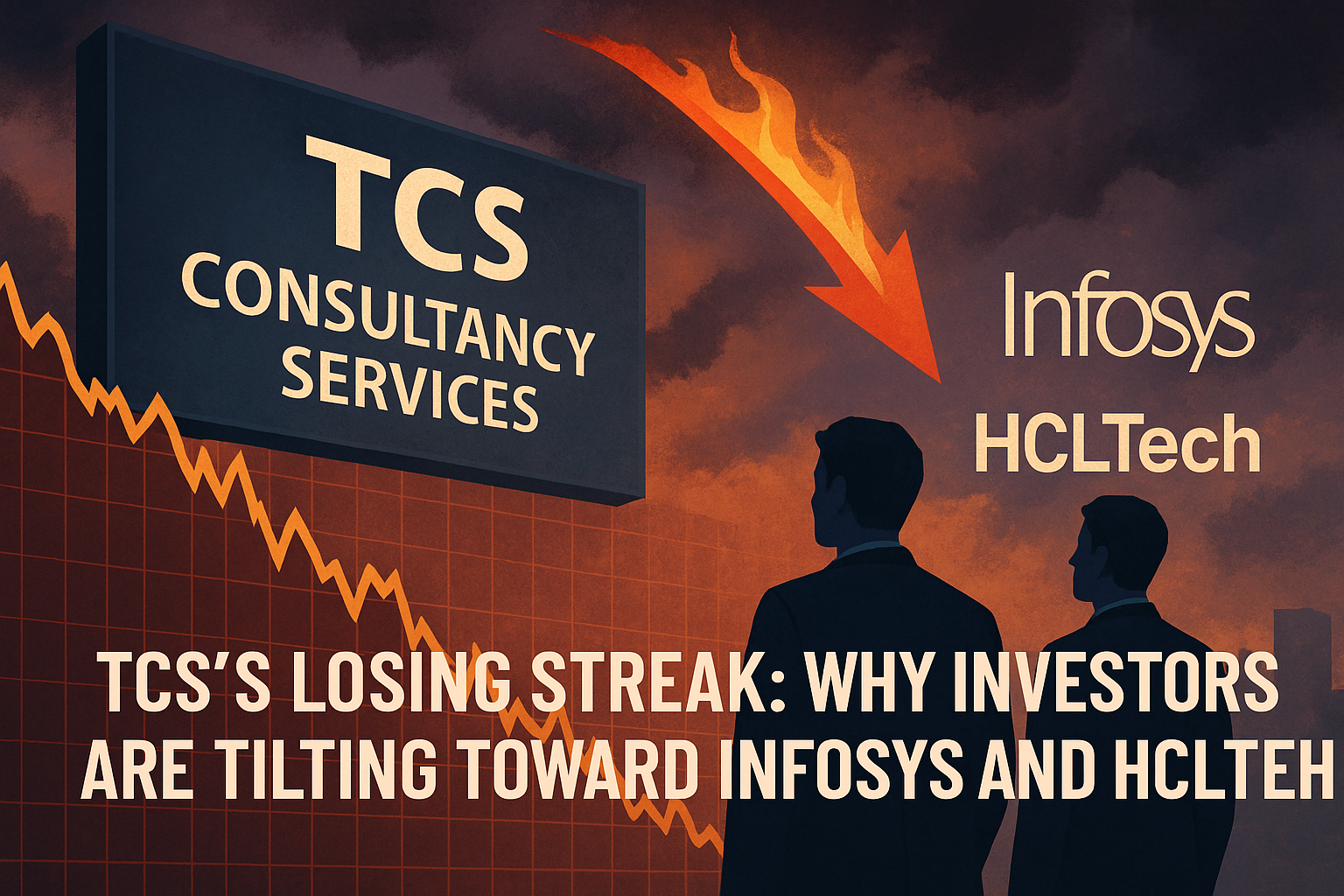Tata Consultancy Services Ltd (TCS), India’s largest IT services firm, is facing a period of introspection. After three consecutive quarters of revenue decline, TCS is now trading at a discount to its closest rivals—Infosys Ltd and HCL Technologies Ltd. Despite its size and legacy, investors are increasingly eyeing greener pastures, drawn by stronger growth prospects at its competitors. Here’s a deeper dive into what’s driving this shift.
A Rare Valuation Discount
For years, TCS commanded a valuation premium thanks to its scale, reputation, and consistent execution. As of mid-July, TCS shares are trading at 24.6 times their forward earnings, lagging behind Infosys (25.9) and HCLTech (36.2). This is a stark reversal from historical trends: TCS last traded at a discount to Infosys in January 2022, and to HCLTech as far back as September 2010.
The price-to-earnings (P/E) ratio, a key measure of valuation, signals how much investors are willing to pay for each rupee of earnings. A higher P/E typically reflects stronger growth expectations. The current discount on TCS thus underscores a waning investor confidence.
Sliding Revenues and Market Sentiment
TCS’s share price has fallen over 20% this year on the NSE, compared to declines of about 15% and 14.5% for Infosys and HCLTech, respectively. Analysts at Kotak Institutional Equities attribute TCS’s struggles to reduced competitive advantage, as rivals have caught up in large deal structuring and digital capabilities. The competitive landscape has been further intensified by ambitious mid-tier firms and renewed pushes from Tier-1 players.
TCS’s sequential revenue decline began in the October-December quarter of 2023, followed by continued contraction in January-March and April-June. In contrast, Infosys and HCLTech have shown relatively steadier, though not flawless, revenue trajectories. This sustained dip has dented market sentiment around TCS, pushing investors to consider firms with more robust short-term growth.
The Struggle for Mega Deals
A major factor behind TCS’s underperformance is its inability to secure large, billion-dollar deals. While TCS has historically excelled in mega contracts, its last significant win excluding internal Tata group deals came in 2022. Meanwhile, Infosys and HCLTech have bagged multiple large deals during this period.
Additionally, two of TCS’s major recent contracts—BSNL ($1.83 billion) and Jaguar Land Rover (£800 million)—face challenges. BSNL is unlikely to generate substantial future revenue for TCS, and JLR’s slowing sales may restrict further IT spending.
These dynamics have made investors skeptical of TCS’s ability to maintain its growth edge.
Leadership Shifts and Internal Realignments
Recognizing these headwinds, TCS’s leadership has undergone significant changes. Since K. Krithivasan took over as CEO in June 2023, the company has brought in Aarthi Subramanian as COO and Mangesh Sathe as Chief Strategy Officer. These appointments aim to sharpen the firm’s strategic focus, especially as clients increasingly look for AI-led transformations and ROI-driven projects.
However, analysts from Motilal Oswal remain cautious, noting that growth for TCS continues to be “elusive.” The rapid adoption of generative AI has upended traditional IT service models, as clients demand productivity improvements that could suppress future revenue streams.
Margins and Market Strength: Silver Linings
Despite these challenges, TCS retains industry-leading margins, ending June with an operating margin of 24.5%, outpacing Infosys (21%) and HCLTech (17.9%). It also remains India’s most valuable IT services company with a market capitalization of $137.6 billion—significantly higher than Infosys’s $77.2 billion and HCLTech’s $51.7 billion.
Moreover, TCS’s total contract value (TCV) for the first quarter of FY26 rose to $9.4 billion, up 13% year-on-year. This robust order book offers a potential cushion against immediate revenue pressures and could be a sign of stabilizing demand.
The Road Ahead
Investor preference for Infosys and HCLTech is rooted in their recent growth momentum and the perception of more consistent deal wins. Analysts like JM Financial’s Abhishek Kumar believe that TCS’s valuation gap may close once macroeconomic headwinds abate and growth realigns.
However, for now, the market narrative favors firms showing resilience and agility amid evolving client demands and technology shifts.
Conclusion
TCS’s challenges highlight a broader industry transformation, as IT services shift from scale and execution to innovation and client-centric value creation. While TCS still commands formidable financial strength and operational efficiency, it faces a critical juncture in redefining its growth story. The coming quarters will determine whether its strategic pivot can help reclaim its premium stature—or if investors will continue to favor its faster-moving rivals.
Feel free to share your experiences and insights in the comments below. Let’s continue the conversation and grow together as a community of traders and analysts.
By sharing this experience and insights, I hope to contribute to the collective knowledge of our professional community, encouraging a culture of strategic thinking and informed decision-making.
As always, thorough research and risk management are crucial. The dynamic nature of financial markets demands vigilance, agility, and a deep understanding of the tools at your disposal. Here’s to profitable trading and navigating the election season with confidence!
Ready to stay ahead of market trends and make informed investment decisions? Follow our page for more insights and updates on the latest in the financial world!
For a free online stock market training by Yogeshwar Vashishtha (M.Tech IIT) this Saturday from 11 am – 1 pm, please sign up with https://pathfinderstrainings.in/training/freetrainings.aspx
Experience profits with my winning algo strategies – get a free one-month trial with ₹15 lakh capital! – https://terminal.algofinders.com/algo-terminal
Disclaimer
This article should not be interpreted as investment advice. For any investment decisions, consult a reputable financial advisor. The author and publisher are not responsible for any losses incurred by investors or traders based on the information provided.


